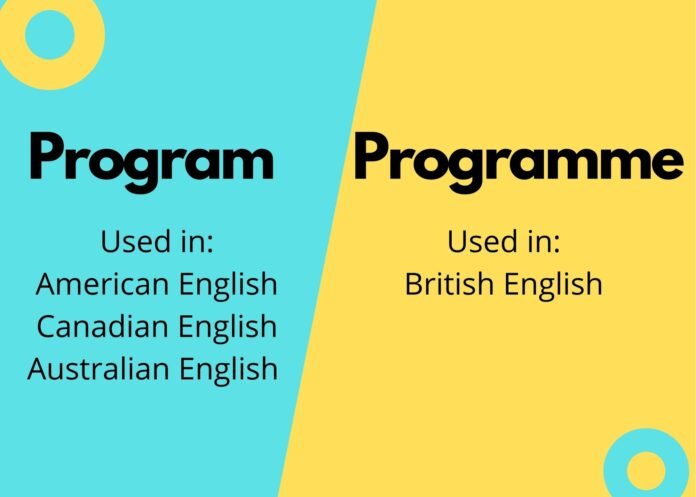When you see the words “program or programme,” you might wonder which one to use. The truth is, “program or programme” can be tricky because different people use these words in different ways. In American English, “program” is the correct choice, while British English prefers “programme.” So, which one should you use? It really depends on where you are and what kind of English you are using.
In the United States, you’ll usually see “program” for both written and spoken English. But if you’re in the UK, “programme” is the way to go, especially in everyday writing. However, even British people use “program” when talking about computers and technology. Let’s dive deeper into these differences and clear up any confusion!
Introduction to “Program or Programme”
The words “Program or Programme” might seem like they mean the same thing, but the spelling changes depending on where you are in the world. In American English, “program” is the spelling you’ll use most of the time. On the other hand, British English prefers the spelling “programme.” This difference can be confusing, especially if you’re writing for a global audience or just trying to make sure your writing is correct. Let’s break down the differences so you can use these words confidently.
The American Way: “Program”
In the United States, “program” is the correct spelling for both the noun and the verb forms of the word. A “program” can refer to a plan of action, a list of events, or even a computer application. For example, if you are talking about a schedule for a school event, you would use “program”:
- “The school announced a new program to help students with their studies.”
When it comes to computers, “program” is also used in American English:
- “She wrote a computer program to solve complex math problems.”
As a verb, “program” means to create or set up something to work in a certain way. For instance:
- “He programmed the alarm to ring at 7 AM every day.”
The British Way: “Programme”
In British English, the word “programme” is used for most of the same meanings that “program” covers in American English. This includes referring to a plan, a broadcast, or a list of events. For example:
- “The charity organized a new programme to help the local community.”
When it comes to broadcasting, such as television or radio shows, “programme” is the preferred spelling:
- “I watched an interesting programme about wildlife last night.”
However, when British people are talking about computer-related topics, they often use “program” instead of “programme.” This can seem a bit odd, but it’s just one of those quirks of language. For example:
- “He’s working on a computer program that helps with graphic design.”
Key Differences to Remember
Here’s a quick summary to help you remember when to use “Program or Programme”:
- American English: Use “program” for everything—plans, lists, and computer-related topics.
- British English: Use “programme” for plans, broadcasts, and lists. Use “program” only for computer-related topics.
Common Mistakes to Avoid
- Mixing Spellings: Make sure you stick to one spelling based on your audience. If you are writing for an American audience, always use “program.” For a British audience, use “programme” when appropriate.
- Context Confusion: Remember that the context can help you decide which spelling to use. If you’re discussing a TV show or a charity plan in British English, use “programme.” If it’s about computer code, “program” is usually the correct choice.
- Inconsistent Use: Avoid switching between “Program or Programme” within the same document or conversation. Consistency is key to clear communication.
Examples of Usage
Let’s look at some more examples to make things clearer:
- American English: “The new fitness program has been very popular.”
- British English: “The government has launched a new health programme.”
In the context of technology:
- American English: “He designed a new program for his company’s website.”
- British English: “She developed a software program to improve efficiency.”
Conclusion
In summary, knowing when to use “Program or Programme” can help you write clearly and correctly. If you’re in the United States or working with American English, just stick to “program” for everything. But if you’re writing for a British audience, remember to use “programme” for most things, except for computer-related topics where “program” is still used. Keeping these simple rules in mind will make your writing more professional and easier to understand.
Don’t let the differences between “Program or Programme” confuse you. Just remember the basics—American English loves “program,” while British English prefers “programme” for most uses. With this knowledge, you’ll be able to choose the right spelling and communicate more effectively, no matter where your readers are from.
FAQs
Q: What’s the main difference between “program” and “programme”?
A: The main difference is where you use them. “Program” is used in American English for everything. “Programme” is used in British English for most things, except computers where “program” is preferred.
Q: Can I use “programme” when writing about computers in British English?
A: No, in British English, even for computers, you should use “program” instead of “programme.”
Q: Which spelling should I use if my audience is international?
A: If your audience is international, it’s safest to use “program,” as it is understood by both American and British readers.
Q: Is there a difference in pronunciation between “Program or Programme”?
A: No, the pronunciation is the same for both words. The difference is only in spelling.
Q: Do I need to worry about “Program or Programme” in casual writing?
A: For casual writing, it’s still good to use the correct spelling for your audience. However, people might be more forgiving in informal contexts.

